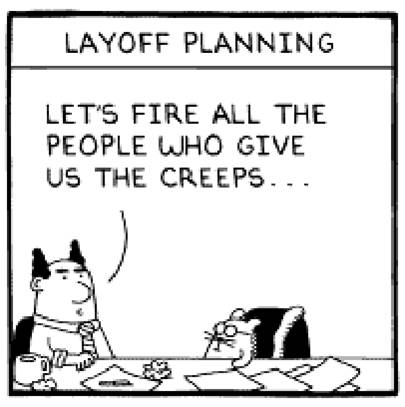Unfortunately, the downturn is placing pressure on a lot of organizations to do layoffs. In recent days we have read about them at GM, eBay, and Tesla (the electric car company). And there are going to be a lot more. I have written quite a bit about downsizing, as much of my earlier research focused on organizational decline and death. You can see some of my major arguments summarized here, here, and here at Harvard Online. One big lesson from research on downsizing is that when organizations hold-off on layoffs as long as possible and do less deep cuts, they tend to bounce back faster (compared to similar organizations that rely more heavily on layoffs) when the upturn hits (especially organizations with skilled workers). This happens, in part, because they save recruiting and training costs when the demand for their people returns, and by keeping their experienced workforce around, they can move more effectively than competitors who are scrambling to hire and train new employees with the right skills. I noticed, for example, that Toyota is using the downturn to train employees — to increase the skills of their existing workforce so that, when demand increases again, they can come back even stronger.
The other lesson I take away from the research on downsizing is that, if you must do layoffs, do it in a manner that gives people as much predictability about how and when it will be done, as much understanding about why it is necessary for business reasons, and as much control over their lives in the process. Finally, expressing human compassion to those who lose jobs, those who stay (who are losing friends, may feel guilty for not being cut, and also often fear the next round of cuts) , and the surrounding community also helps everyone get through tough times, and increases productivity and loyalty among those employees who survive layoffs.
I was also reminded of another lesson about layoffs from an email exchange I've been having with Bill Burnett, over at Superinnovator. A downturn can be an opportunity to get rid of incompetent people and, of course, destructive assholes. But beware of the evils of using layoffs as a reason to expel everyone in your organization who does not act, think, and look like everyone else — beware that most of us are prone to hold an overly narrow image of a "good employee." As I show in Weird Ideas that Work, since we human-beings have powerful and positive emotional reactions to people who are "just like us," and equally powerful negative reactions to people who are "different," the hiring process in most organizations acts to "bring in the clones." Or as Harvard's Rosabeth Moss Kanter famously put it her classic Men and Women of the Corporation, organizations engage in "homosocial reproduction."
As this Dilbert cartoon suggests, the same psychological forces that cause leaders to bring in the clones during the hiring process can also cause them to (unwittingly)get rid of the people who think differently than everyone else and perhaps are prone to constructive argument. So a risk of the layoff process in many organizations is that it drives out the variation and diversity so essential to innovation in every organization. Take a close look at the people you are keeping versus those you are cutting. Are you unwittingly protecting the clones, those people just like your favorite person — yourself? And are you consistently expelling able people who make you squirm, who give you the creeps at Scott Adams put it, but who will assure that your organization won't be condemned to be stuck in the past?
